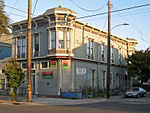Peralta Villa, Oakland, California
Alameda County, California geography stubsNeighborhoods in Oakland, California
Peralta Villa is a neighborhood in Oakland in Alameda County, California. It lies at an elevation of 20 feet (6 m). It was formerly an unincorporated community.
Excerpt from the Wikipedia article Peralta Villa, Oakland, California (License: CC BY-SA 3.0, Authors).Peralta Villa, Oakland, California
Kirkham Street, Oakland
Geographical coordinates (GPS) Address Nearby Places Show on map
Geographical coordinates (GPS)
| Latitude | Longitude |
|---|---|
| N 37.8075 ° | E -122.29138888889 ° |
Address
Kirkham Street 998
94607 Oakland
California, United States
Open on Google Maps






